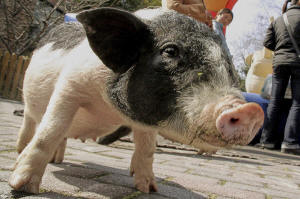Chinese researchers report a pig kidney transplant and a first-step
liver experiment
[March 27, 2025]
By LAURAN NEERGAARD
WASHINGTON (AP) — Chinese researchers are reporting new steps in the
quest for animal-to-human organ transplants – with a successful pig
kidney transplant and a hint Wednesday that pig livers might eventually
be useful, too.
A Chinese patient is the third person in world known to be living with a
gene-edited pig kidney. And the same research team also reported an
experiment implanting a pig liver into a brain-dead person.
Scientists are genetically altering pigs so their organs are more
humanlike in hopes of alleviating a transplant shortage. Two initial
xenotransplants in the U.S. — two pig hearts and two pig kidneys – were
short-lived. But two additional pig kidney recipients so far are
thriving – an Alabama woman transplanted in November and a New Hampshire
man transplanted in January. A U.S. clinical trial is about to begin.
Nearly three weeks after the kidney surgery the Chinese patient "is very
well” and the pig kidney likewise is functioning very well, Dr. Lin Wang
of Xijing Hospital of the Fourth Military Medical University in Xi’an
told reporters in a briefing this week.

Wang, part of the hospital's xenotransplant team, said the kidney
recipient remains in the hospital for testing. Chinese media have
reported she is a 69-year-old woman diagnosed with kidney failure eight
years ago.
But Wang pointed to a potential next step in xenotransplantation —
learning to transplant pig livers. His team reported Wednesday in the
journal Nature that a pig liver transplanted into a brain-dead person
survived for 10 days, with no early signs of rejection. He said the pig
liver produced bile and albumin — important for basic organ function —
although not as much as human livers do.
[to top of second column]
|

A miniature pig waits for visitors to feed it at a zoo in Shanghai,
China, on Thursday Feb. 15, 2007. (AP Photo/Eugene Hoshiko, File)
 The liver is a complex challenge
because of its varied jobs, including removing waste, breaking down
nutrients and medicines, fighting infection, storing iron and
regulating blood clotting.
“We do find that it could function a little bit in a human being,”
Wang said. He speculated that would be enough to help support a
failing human liver.
In the U.S. last year, surgeons at the University of Pennsylvania
attempted that sort of “bridge” support by externally attaching a
pig liver to a brain-dead human body to filter blood, much like
dialysis for failing kidneys. U.S. pig developer eGenesis is
studying that approach.
In China, Wang’s team didn’t remove the deceased person’s own liver,
instead implanting the pig liver near it.
That “clouds the picture,” said Dr. Parsia Vagefi, a liver
transplant surgeon at UT Southwestern Medical Center who wasn't
involved with the work. “It’s hopefully a first step but it’s still,
a lot like any good research, more questions than answers.”
Wang said his team later replaced the human liver of another
brain-dead person with a pig liver and is analyzing the outcome.
According to media reports, another Chinese hospital last year
transplanted a pig liver into a living patient after a piece of his
own cancerous liver was removed but it’s unclear how that experiment
turned out.
All contents © copyright 2025 Associated Press. All rights reserved |